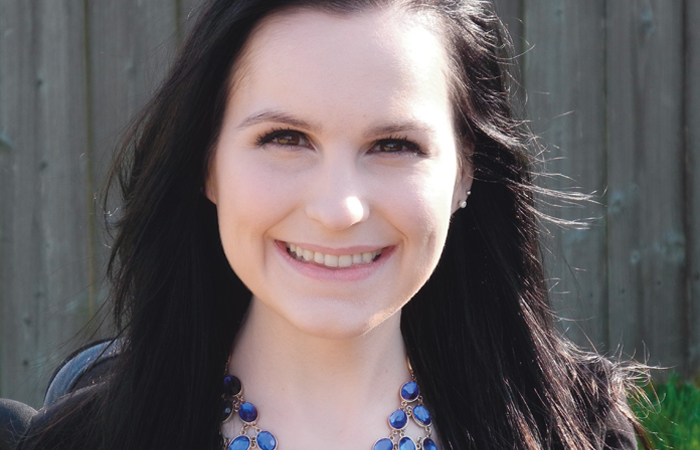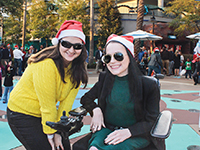
Independent Pro

Lauren Carter loves life as a young professional
Like many of us, 25-year-old Lauren Carter’s path to her chosen career took a few turns along the way.
“I was definitely one of those students all throughout high school who was constantly changing my mind about what I wanted to do with my life,” Carter says. She considered becoming a doctor or a lawyer, as well as a cook, even though she admits to being terrible at cooking.

As she entered her last year of high school, broadcast journalism appeared on her radar. Carter, who was diagnosed with spinal muscular atrophy (SMA) as a baby, served as MDA National Goodwill Ambassador when she was 8 years old. This experience included a lot of time in front of cameras — perfect practice for a career in broadcasting. “After everything that I had done with MDA, I knew how to be on camera. I had experience with it, and it was fun when I was younger.”
Turns out, being in front of the camera as an adult wasn’t as much fun for Carter. A media technology course during high school helped her confirm that she wanted to work in communications, so she switched her focus to public relations. After graduating from the University of Houston in 2013, she landed a job in her field, which she describes as “a dream come true.”
Finding her voice
Carter always knew she wanted to pursue higher education, but she admits she was concerned about how her disability would affect her in college, especially when she decided to attend without the personal care assistant who had been with her throughout high school.
“I had the most wonderful aide,” Carter says. “Gail made sure I had everything I needed, and then she let me be a regular teenager. She was kind of like my school mom.”
But when it came time for college, Carter decided to go it alone. Her university offered disability services, so she knew she would be able to seek assistance if she needed it. “I decided that I wanted to try it independently and see how it went. It was great. I didn’t use an aide the entire time.”
Going to college without a personal care assistant meant that Carter had to learn to be assertive and deal with any problems herself. “Practically from birth until I graduated high school, I had always had a great support system. They did the majority of the work for me,” she says. “It was finally in college that I was able to be independent and do things on my own. It was where I grew up and where I was able to find my voice and learn how much power I have as an independent person.”
Financially smart
While in college, Carter lived at home to keep costs down. This decision, along with the scholarships she received, meant she was able to graduate without debt.
Now that she’s working full time, the idea of moving out is on her mind. “We want to be young professionals living in our cute little overpriced apartments,” says Carter, adding that she’s itching to decorate her own place.
But Carter is determined to be financially smart about her future. “I’m going to need some type of personal care assistant or nurse to help me with the big things, like helping me transfer from my bed to my wheelchair. That has a cost associated with it,” she says. “Because of my disability, I really can’t make impulsive decisions. I thought about it on my own, and then I discussed it with my parents. They allowed me the opportunity to stay at home so that I could save for my future.”

Full circle
Carter has worked for CITGO’s corporate communications team since May 2015. She says the experience has been fantastic because of CITGO’s longtime support of MDA families across the country. “It’s very strange because I first met people with CITGO when I was National Goodwill Ambassador back in 2000. I don’t know if it’s full circle or if it’s just an interesting interconnection, but it’s great.”
Understanding that not all graduates find employment in their chosen field, Carter says she feels very fortunate to have a job where she can apply what she learned in college. “It sounds very corny saying it’s a dream come true, but it kind of is.”
This dream is not without its challenges, and for Carter, the biggest is fatigue. “I do get tired a lot because of my disability. It may take me longer to do things, so I just have to be conscious of time management and making sure that I’m not overloading myself.”
Her manager and co-workers are very supportive and understanding, she says. “I think that’s another amazing thing about working here [at CITGO] is that I work with people who do understand what I’m going through. If there is something that I need help with, I can go to them and they’ll understand.”
Carter has big plans for the future, including a mile-long travel wish list and dreams of pursuing her MBA. “There are so many places I want to go, causes I want to support and things I want to learn. I hope that I can continue sharing my story and showing people that a physical disability does not define you and encouraging them to never give up on what they want to achieve. A physical disability doesn’t mean, “No, you can’t do something,” it just means you find a different way to do it.
Charmaine Dymond is a freelance writer based in Halifax, Canada.
CITGO: 30 Years of Making a Difference for MDA Families
Since 1986, CITGO Petroleum Corp. and its employees have supported MDA’s mission to help kids and adults with neuromuscular diseases in hometowns across America live longer and grow stronger. Based in Houston, CITGO is a refiner, transporter and marketer of transportation fuels, lubricants, petrochemicals and other industrial products.
CITGO’s 30-year commitment to MDA’s lifesaving cause has helped improve the lives of countless children and adults living with neuromuscular diseases. As MDA’s largest corporate sponsor, CITGO has set the standard in fueling the fight to find treatments and cures for neuromuscular diseases.
“Working with MDA is a great way for our nearly 5,300 locally owned stations to get involved in their communities, and on a corporate level, our employees can rally around and support this important cause,” says Rick Esser, CITGO’s vice president of supply and marketing.
Together with CITGO, MDA is working to provide families with much-needed hope, answers and support. Because of CITGO’s unparalleled support, MDA is bringing strength, independence and life to families by finding research breakthroughs across diseases; caring for individuals and families from day one; and empowering families with services and support, including equipment assistance, support groups, MDA Summer Camp for kids and more.
A Snapshot of CITGO’s Support for MDA Families
• $200+ million raised since 1986
• $15 million raised in 2016
• 1.6 million MDA Shamrocks sold this year at 5,300 locally owned CITGO stations across the country
• 60 special MDA fundraising events sponsored each year by CITGO
MDA Resource Center: We’re Here For You
Our trained specialists are here to provide one-on-one support for every part of your journey. Send a message below or call us at 1-833-ASK-MDA1 (1-833-275-6321). If you live outside the U.S., we may be able to connect you to muscular dystrophy groups in your area, but MDA programs are only available in the U.S.
Request Information